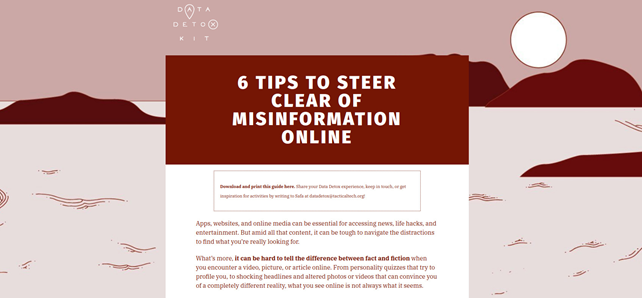Guest post by Sasha Ockenden, Communications Coordinator, Tactical Tech
Misinformation and Disinformation
At Tactical Tech, we work on many different topics in the fields of technology and human rights – from privacy to security to citizen investigation – but one of the most topical at the moment is misinformation.
You’ve probably seen the word in the news a lot recently, but what exactly does it mean? ‘Misinformation’ is defined as “incorrect or misleading information” – regardless of why this information is spread – as opposed to disinformation, which is spread with the intention to mislead people.
Whilst the concept of ‘misinformation’ has existed for centuries, the word ‘disinformation’ came from the Russian ‘dezinformatsiya’, purportedly coined by Stalin as a label for Soviet propaganda campaigns. Perhaps the most famous of these, ‘Operation Infektion’, instructed East German intelligence to disseminate the claim that HIV/AIDS was man-made by the United States as a biological weapon, rather than originating in animals.
Coronavirus Misinformation
The coronavirus pandemic has thrown up examples of both misinformation and disinformation. These range from conspiracy theories linking coronavirus to 5G technologies, to suggestions that coronavirus was man-made – although this time, the American government is not the object but the subject of these accusations, with Donald Trump propagating misleading information in spite of his own intelligence specialists and scientists.
Some of these theories have been intentionally created or supported by heads of state and state-sponsored media (disinformation), while others may have originated in misunderstandings, panic or good intentions (misinformation). However, what makes both types dangerous is the speed at which they spread fear across a wide range of platforms – and how this fear can turn to hate.
Misinformation, Hate & Social Media
Stop Funding Hate has successfully harnessed people power to persuade companies like Lego and The Body Shop to stop advertising in platforms which have fuelled hate, including the Daily Mail, The Sun and the Daily Express. Whilst these conventional media platforms have provided some support to misleading coronavirus theories, they are often forced to retract those which fly in the face of scientific evidence. A Daily Express article titled “Coronavirus conspiracy: ‘China unleashed plague’ in lab leak – shock cover-up claim” was quickly revised so that the headline instead ended “…cover-up claim debunked”.
However, misinformation on social media is less regulated and much harder to combat. Tactical Tech’s co-founder and Executive Director Stephanie Hankey has written about how coronavirus misinformation spreads via WhatsApp, stating: “WhatsApp is so powerful because it is so deeply intimate”. The same is true of other platforms that connect us with people we know and trust, like Facebook and Twitter. In response to criticism, these platforms have now implemented measures to counter coronavirus misinformation, including adjusting search results, linking to trusted organisations like the WHO, and (in the case of WhatsApp) making it harder to forward viral messages to large numbers of people.
Nevertheless, these measures have been criticised, including by British MPs, as being “too little, too late”. A study of coronavirus misinformation between January and March suggested that in April, 59% still remained up on Twitter, 27% on YouTube, and 24% on Facebook. In fact, until late April, advertisers on Facebook were even able to specifically target users interested in ‘pseudoscience’.
As Stop Funding Hate has pointed out, while social media can be an effective way to exert pressure on advertisers, its role in spreading misinformation makes it a powerful driver of hate speech and hate crime. Unfounded conspiracies about the nature and origin of coronavirus have fuelled anti-Semitic and Islamophobic incidents, as well as racist reprisals against Chinese people worldwide and even against Africans within China itself.
What can you do?
How can we combat online misinformation? All of Tactical Tech’s four main projects – the Data Detox Kit, The Glass Room, Exposing the Invisible and Data and Politics – work to provide solutions.
On an individual level, the Data Detox Kit includes a simple printable guide, ‘6 Tips to Steer Clear of Misinformation Online’, which explains how to spot misinformation, avoid spreading it, and burst your ‘filter bubble’. The Glass Room, a series of interactive exhibitions visited by around 100,000 people across the globe last year, is planning to launch a new ‘Misinformation Edition’. To help ordinary citizens carry out digital investigations, Exposing the Invisible’s guide ‘Who, what, why, where? Verification of online data’ provides practical resources to counter misinformation. Finally, our Data & Politics team has collated a number of in-depth articles about the consequences of our political systems moving online as a result of coronavirus, including platforms for potential disinformation.
On a collective level, the techniques developed by Stop Funding Hate to put pressure on conventional media can also be applied to social media. Coalitions such as the Conscious Advertising Network (CAN) bring advertisers together to combat misinformation on digital platforms, and for the past two years Stop Funding Hate has campaigned for social media platforms themselves to take more responsibility for harmful content.
The signs are that social media is the new battlefield in the fight between information and misinformation, and that the coronavirus pandemic has forced social media platforms to start taking action. By supporting the work of Stop Funding Hate and Tactical Tech, you can learn how to help prevent the spread of misinformation and the hatred it fuels – and encourage social media platforms to do the same.
***
Tactical Tech
Since 2003, the international NGO Tactical Tech has worked to investigate and mitigate the impact of technology on society. We use our findings to create practical solutions for citizens and civil society actors.
To find out more about our work, sign up to our newsletter or follow us on Facebook or Twitter.
